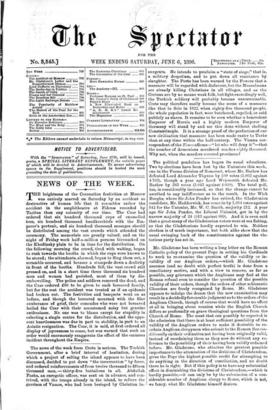Mr. Gladstone has been writing a long letter on the
Roman Catholic policy of the present Pope in setting his Cardinals to work to re-examine the question of the validity or in- validity of our Anglican orders,—which Mr. Gladstone assumes (and no doubt with perfect truth) is done from a conciliatory motive, and with a view to remove, as far as possible, any grievance which the Anglicans may feel at the Roman refusal even to consider the question of the possible validity of their orders, though the orders of other schismatic Churches are freely recognised by Rome. Mr. Gladstone appears to indulge the dream that the new examination may result in a decidedly favourable judgment as to the orders of the Anglican Church, though of course that would have no effect at all in bringing about reunion while the English Church differs so profoundly on grave theological questions from the Church of Rome. The most that can possibly be expected is the admission that there is at least sufficient possibility of the validity of the Anglican orders to make it desirable to re- ordain Anglican clergymen who submit to the Roman See con- ditionally on their ordination not having been originally valid, instead of reordaining them as they now do without any re- ference to the possibility of their having been validly ordained before. Mr. Gladstone, who attaches the greatest possible importance to the attenuation of the divisions of Christendom, gives the Pope the highest possible credit for attempting to do anything in the direction of conciliation, and no doubt there he is right. But if this policy is to have any substantial effect in diminishing the divisions of Christendom,—which is hardly possible,—it can only be by the submission of a con- siderable number of Anglican clergy to Rome, which is not, we fancy, what Mr. Gladstone himself desires.






































